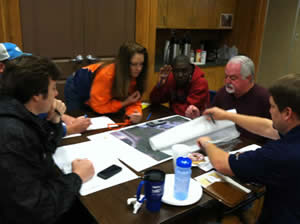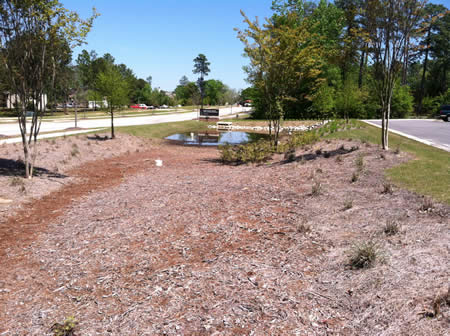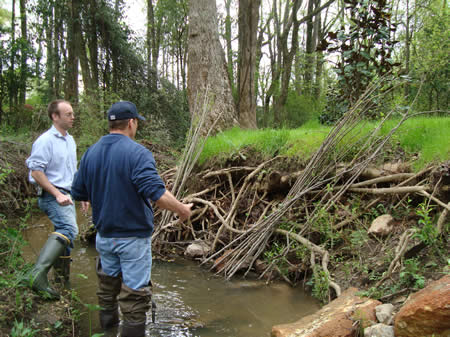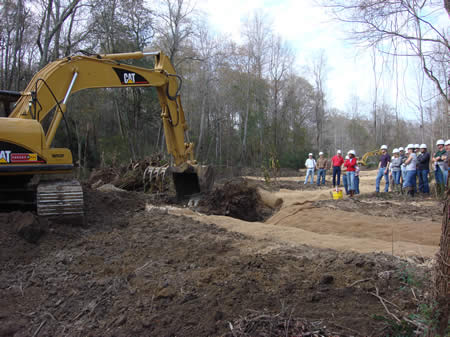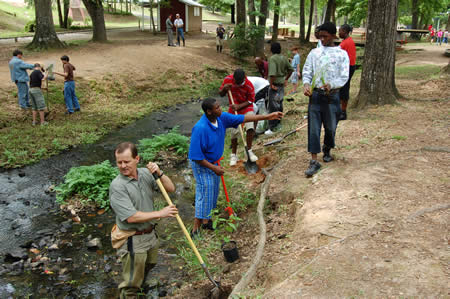- Alabama Agricultural Irrigation Information Network
- Alabama Natural Resources Council: Water Resources
- Alabama Water Watch
- ALEARN: Fisheries & Aquaculture Extension: Natural Resources
- Conservation & Rainwater Collection
- Drinking Water & Human Health
- Education & Outreach
- Environmental Restoration
- Nutrient & Pesticide Management
- Pollution Assessment & Prevention
- Wastewater & Wastewater Management
- Water Conservation & Management
- Water Policy & Economics
- Water Resources Publications
- Watershed Planning
- Workshop & Training Opportunities
- Water Resources Home
ACES Water Program Training Schedule
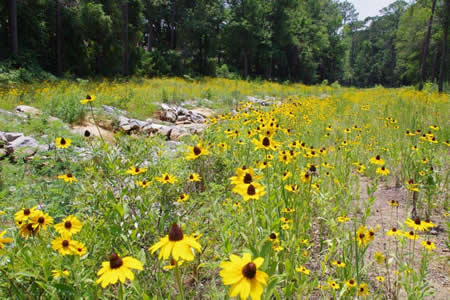 |
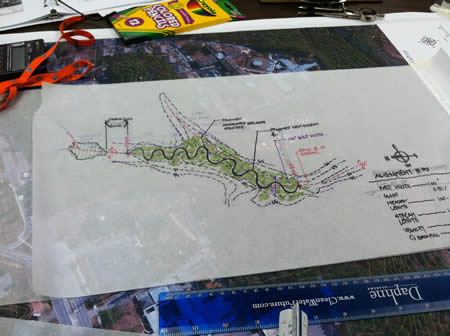 |
2017
January 24-26, 2017, Stream Restoration Design Workshop, Auburn, AL
Stream Restoration Design Workshop
January 24-26, 2017
City of Auburn Meeting Room
122 Tichenor Avenue
Auburn, AL 36830
This 3-day workshop introduces concepts of stream restoration using natural channel design techniques. Students work in small groups in the field to assess existing stream condition geomorphic conditions and develop reference reach design parameters. A case study design exercise will include application of morphological design parameters to create design plans for channel dimension, pattern, and profile. Design products include stream channel layouts, typical cross-sections, and longitudinal profiles, and basic hydraulic and sediment transport calculations. Other topics include in-stream structures, plan sheet development, design specifications, and construction.
The third day will include a demonstration of AutoCAD three-dimensional design development in conjunction with two-dimensional hydraulic modeling to minimize risk. Students should bring field gear, waders, and a laptop for spreadsheet calculations. This workshop requires an understanding of stream morphology assessment and terminology.
Instructors:
Greg Jennings, PhD, PE, NC State University Professor Emeritus
Eve Brantley, PhD, Alabama Cooperative Extension System, Auburn University, Associate Professor
Mike Geenen, PE, Watershed Restoration, Principal
John Curry, PE, Hydro-Engineering
Online Registration * Open Now *
General registration $600
Government / Nonprofit registration $450
Workshop is limited to 25 participants.
Continuing Education Units from Auburn University will be available.
Lodging
There are several hotels in Auburn convenient to the workshop location including:
* Auburn University Hotel and Conference Center, www.auhcc.com
* Fairfield Inn and Suites, www.marriott.com/hotels/travel/csgao-fairfield-inn-and-suites-auburn-opelika/
* Holiday Inn Express, www.ihg.com/holidayinnexpress/hotels/us/en/auburn/auoau/hoteldetail
Partners: City of Auburn, Auburn University, Alabama Cooperative Extension System
|
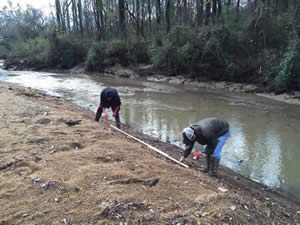 |
2016
May 10-11, 2016 Alabama Storm Water Symposium - Registration Open!
August 24-25, 2016, Clear Water Alabama Seminar and Field Day, Madison, AL
October 26-28, 2016 Fundamentals of Stream Morphology and Ecology Assessment, Auburn, AL
 |
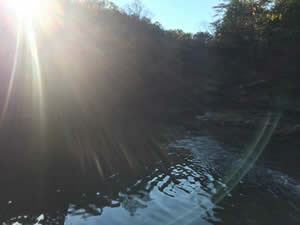 |
2016 Clear Water Alabama Seminar and Field Day
August 24-25, 2016
Insanity Complex
100 Skate Drive
Madison, Alabama
The Clear Water Alabama Seminars
and Field Day are offered by the
Alabama Erosion and Sediment Control
Partnership to help planners, designers,
contractors, inspectors, and others learn
more about erosion and sediment control
practices and products. The Seminar on August 24 will provide an overview of regulations, applications, innovative practices and products,and research updates. The Field Day on August 25will visit local sites and provide an opportunity to learn from on-the-ground experiences.
Download registration flyer (pdf)
Who Should Attend?
- Representatives from construction firms that utilize/install BMPs on their sites
- Road builders and engineers
- Representatives from firms that prepare erosion control/stormwater plans
- County and city engineers and/or their staff
- Representatives of local Home Builders
Association and Associated General
Contractors
- Representatives from the Alabama
Department of Transportation
- Inspectors from the Alabama Department
of Environmental Management
- Soil and Water Conservation District Boards
and their field employees
- City and county officials (county
commissioners, city council, and planners)
- Staff of Natural Resources Conservation
Service field offices
Registration
Online Registration
$95 QCI Training* (Aug. 25 Field Day)
Student scholarships available - professors should contact Earl Norton.
* QCI training is applicable only to QCIs certified by HBAA and requires an additional fee of $95. The August 25 classroom training and field day complete the mandatory 4-hour continuing education requirements.
Lunch and certificates of training will be provided each day. Contact hours will be included on the certificates to reflect the potential continuing education units.
Lodging
Coming soon
Partnership Members
- AL Soil and Water Conservation Committee
- AL Associated General Contractors
- AL Association of Conservation Districts
- AL Chapter Soil and Water Conservation Society
- AL Department of Environmental Management
- AL Department of Transportation
- Auburn University
- Alabama Cooperative Extension System
- Home Builders Association of AL
- Natural Resources Conservation Service
Industry Sponsors (Tentative)
- Alabama Power Company
- American Excelsior Company
- Erosion Pros, L.L.C.
- Hanes Geo Components
- J.W. Faircloth & Son, Inc.
- Motz Enterprises, Inc.
- Pennington Seed Inc.
- Southeast Environmental Consultants
- Southern Pipe
- Sunshine Supplies, Inc.
- Thompson Engineering, Inc.
|
 |
Fundamentals of Stream Morphology and Ecology Assessment, October 26-28, 2016
City of Auburn Harris Center
425 Perry Street
Auburn, AL 36830
Instructors:
Greg Jennings, PhD, PE, NC State University Professor Emeritus
Eve Brantley, PhD, Alabama Cooperative Extension System, Auburn University, Associate Professor
Dusty Kimbrow, MS, City of Auburn Watershed Division
This 3-day workshop introduces concepts of fluvial geomorphology and stream processes related to channel and floodplain formation, bankfull stage identification, regional hydraulic geometry curves, applications of the Rosgen classification system for natural streams in the Southeast, and assessment tools for stream morphological and ecological conditions.
Morning classroom sessions are followed by afternoon field sessions where students work in small groups to measure stream physical and ecological conditions. Students will learn to calculate stream morphology relationships for channel dimension, pattern, and profile by hand and using a spreadsheet. Students will also learn about field techniques for measuring streambank erosion, pebble count techniques for substrate analysis, and channel ecogeomorphology assessment of reference and impaired streams.
These assessment techniques provide a basis for determining a stream system’s departure from reference conditions and opportunities for restoration. Students should bring field gear, waders, calculator, and a laptop for Excel spreadsheet calculations. This workshop is open to individuals from all backgrounds interested in learning to assess stream conditions. Future workshops on stream restoration techniques will be based on the concepts learned in this fundamental workshop.
Agenda (PDF)
Online Registration *Registration is closed - another class will be offered in 2017*
General registration $500
Government / Nonprofit registration $350
Workshop is limited to 25 participants.
Continuing Education Units from Auburn University will be available.
Lodging Information
A block of rooms has been set aside at the new Marriott TownPlace Suites at a government rate of $89.00 + tax or general rate of 109.00 + tax. Group name is 'Stream Workshop' - select this link or send an email to the hotel for more information. Please reserve room by Oct 18.
Government rates are available at the Auburn University Hotel and Conference Center $129.00
Partners: City of Auburn, Auburn University, Alabama Cooperative Extension System
|
Using the Revised Universal Soil Loss Equation (RUSLE2) to Predict Water Erosion and Sediment Deposition on Construction Sites
| Class 1 - Irondale (Birmingham), Alabama 35210 AL Associated General Contractors 5000 Grantswood Road Feb. 2, 2016 8:30 a.m. - 4:00 p.m. Feb. 3, 2016 8:30 a.m. - 12:00 p.m. Register for this class online |
Class 2 - Montgomery, Alabama 36117 Home Builders Association of AL 7515 Halcyon Summit Drive Feb. 4, 2016 8:30 a.m. - 4:00 p.m. Feb. 5, 2016 8:30 a.m. - 12:00 p.m. Register for this class online |
Technical Level: Intermediate to Advanced
Target Audience: Erosion & Sediment Control Planners, Stormwater Planners, Plan Reviewers
Professional Development: 9.0 Contact Hours - 0.9 CEUs, 9.0 PDHs, 9.0 PDUs
Instructor: Ted Sherrod, Raleigh, North Carolina. Ted’s credentials - PE, CPESC, CPSWQ, CMS4S.
About the Course: Federal and state regulations increasingly require the use of erosion prediction models and tools to evaluate the off-site erosion and sediment deposition impacts of construction activities. Participants will learn to load the provided program and follow along as the instructor demonstrates the important functions of the program and the procedures for making soil erosion and sediment delivery runs on construction sites. Participants will learn to independently work example problems and exercises under the instructor’s guidance. During the exercises, participants will participate in group discussions and evaluations. Each participant is required to bring a laptop computer with a current Windows operating system. Participants will be provided a free copy of the RUSLE2 software and a customized training database, user access, and customized user screen template adapted to construction.
The course is sponsored by the Soil and Water Conservation Society – AL Chapter, the Alabama Soil and Water Conservation Committee and Partners, and the IECA – Southeast Chapter
Registration $225
For Payment by Check download the registration flyer (pdf)
Online Registration: Class 1 – February 2-3, 2016; Class 2 – February 4-5, 2016
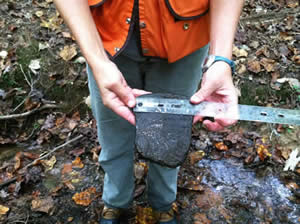 |
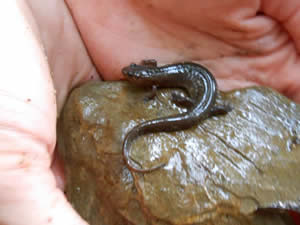 |
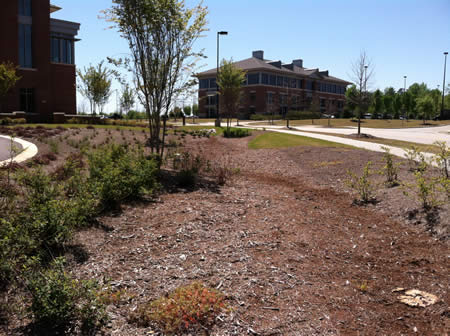 |
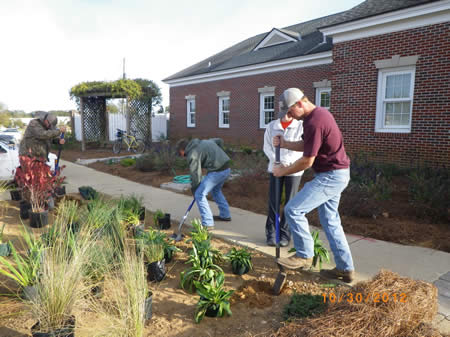 |
2015
January 28, 2015 - Bioretention Design and Implementation, Fairhope, AL
January 29, 2015 - Swales Design and Implementation, Fairhope, AL
February 25, 2015 - Swales Design and Implementation, Fairhope, AL
June 22 - 24, 2015 - Alabama Soil and Water Conservation Society Annual Meeting, Spanish Fort, AL
September 2-3, 2015 - Clear Water Alabama, Tuscaloosa River Market
Stormwater BMP Inspection & Maintenance Certification Workshop
TBD - Check back for new workshop dates in 2016!
Location: Dogwood Room the Vestavia Hills Civic Center
1973 Merryvale Road
Vestavia Hills, AL 35216
This 1.5 day course reviews watersheds, water quality, regulations, and the scientific and engineering basis of stormwater control measures. Attention is given to operation and maintenance of specific stormwater control measures.
What will you gain from this workshop?
- Understand stormwater, how it affects water quality, and requirements associated with it.
- Understand stormwater management devices used in Alabama and how they function.
- Understand inspection and maintenance requirements of each stormwater practice
Government / Nonprofit: $200
Professional / General: $285
0.9 Continuing Education Units (equivalent to 9 PDHs) will be available from Auburn University.
Why is Stormwater BMP Inspection and Maintenance Needed?
Communities across the State of Alabama must manage rainfall that runs off roads, streets and parking lots. This runoff is called stormwater. To manage stormwater, many treatment devices, called BMPs or stormwater control measures (SCMs), have been built. These devices include: wet retention ponds, bioretention areas, swales, stormwater wetlands, permeable pavement, rainwater harvesting systems, proprietary devices, and level spreaders. Stormwater practices must have annual, and sometimes more frequent, inspection and maintenance to perform as intended. Maintenance includes hydrologic and water quality function, landscape functions, and consideration of impacts on human health and safety.
Communities may require annual inspection, and if called for, maintenance of BMPs. BMPs are not managed as standard landscape features, as they are water quality treatment devices, and specialized training is needed to perform inspection and maintenance activities.
Opportunities in Stormwater
BMP Inspection and Maintenance also presents a business opportunity for inspection by licensed professionals such as engineers and landscape architects, and maintenance by landscape and other green industry professionals. Designers will learn to design SCMs/BMPs with maintenance in mind; landscapers can diversify their business to ensure year-round work in a recession proof area of work; and suppliers of materials and technology to the stormwater industry can learn about new and existing opportunities to support the stormwater industry.
Who Should Attend
Commercial Landscapers
Property Managers
Owners
Homeowners Associations
Professionals with Licensure (PE's, PLS's, RLA's)
Regulators
Municipal and County Landscape Personnel
Course Offerings
Agenda
Day 1 - 8:30am-4:30pm
Registration and Welcome
Introduction to Stormwater & Watersheds
Stormwater Regulations
BMP Functions
Elements of BMP Maintenance
Retention Pond Maintenance
Wetland Maintenance
Bioretention Maintenance
Licensing and Certification
3 pm Field Tour of Local BMPs
Day 2 - 8:30am-noon
Level Spreader Maintenance
Maintenance of Green BMPs (Swales, Green Roofs, Cisterns, Infiltration Trenches)
Parking Lot BMPs (Permeable Pavement, Sand Filters, and Proprietary Systems)
Question & Answer
Examination (Open Book)
Instructors
William F. Hunt, III, Ph.D., P.E. is a Professor and Extension Specialist in North Carolina State University's Department of Biological and Agricultural Engineering. Dr. Hunt holds degrees in Civil Engineering (NCSU, B.S.), Economics (NCSU, B.S.), Biological and Agricultural Engineering (NCSU, M.S.) and Agricultural and Biological Engineering, (Penn State, Ph.D.). He is a registered PE in North Carolina.
Since 2000, Hunt has assisted with the design, installation, and/or monitoring of over 90 stormwater best management practices (BMPs), including bioretention, stormwater wetlands, innovative wet ponds, green roofs, permeable pavement, water harvesting/cistern systems and level spreaders. He teaches 20-25 short courses and workshops each year on stormwater BMP design, function, and maintenance throughout North Carolina and the US.
Bill Lord is an Area Environmental Agent with the N.C. Cooperative Extension Service. Mr. Lord has received a BS degree in Horticulture and an MS degree in Entomology from NC State University. A 25-year veteran of North Carolina Cooperative Extension, Mr. Lord has experience in stormwater runoff, nutrient and pesticide management, and plant growth. He has supervised the construction and maintenance of several stormwater practices including stormwater wetlands, wet ponds, and bioretention areas. He also pioneered research on mosquito populations in stormwater facilities across North Carolina. Mr. Lord is a member of NC Cooperative Extension's Watershed Education Network and the Neuse Education Team. Annually, he conducts 12 to 15 workshops on stormwater management practice construction and maintenance throughout North Carolina and the US.
Partners
Alabama Cooperative Extension System, Auburn University, Alabama Clean Water Partnership, Alabama Green Industry Training Center, City of Vestavia Hills
 |
 |
Clear Water Alabama 2015
Urban Development: Protecting Our Water
Tuscaloosa River Market
1900 Jack Warner Parkway, NE
Tuscaloosa, AL 35401
September 2-3, 2015
The Clear Water Alabama Seminars
and Field Day are offered by the
Alabama Erosion and Sediment Control
Partnership to help planners, designers,
contractors, inspectors, and others learn
more about erosion and sediment control
practices and products. The Seminar on September 2 will provide an overview of regulations, applications, innovative practices and products,and research updates. The Field Day on September 3 will visit local sites and provide an opportunity to learn from on-the-ground experiences.
Download registration flyer (pdf)
Who Should Attend?
- Representatives from construction firms that utilize/install BMPs on their sites
- Road builders and engineers
- Representatives from firms that prepare erosion control/stormwater plans
- County and city engineers and/or their staff
- Representatives of local Home Builders
Association and Associated General
Contractors
- Representatives from the Alabama
Department of Transportation
- Inspectors from the Alabama Department
of Environmental Management
- Soil and Water Conservation District Boards
and their field employees
- City and county officials (county
commissioners, city council, and planners)
- Staff of Natural Resources Conservation
Service field offices
Registration
Online Registration
$200 Early Bird Registration September 2-3 (cutoff August 26)
$250 Late Registration
$95 QCI Training* (Sept. 3 Field Day)
Student scholarships available - professors should contact Earl Norton.
* QCI training is applicable only to QCIs certified by HBAA and requires an additional fee of $95. The September 3 classroom training and field day complete the mandatory 4-hour continuing education requirements.
Lunch and certificates of training will be provided each day. Contact hours will be included on the certificates to reflect the potential continuing education units.
Lodging
A limited number of rooms have been blocked nearby at the Tuscaloosa Fairfield Inn.
Partnership Members
- AL Soil and Water Conservation Committee
- AL Associated General Contractors
- AL Association of Conservation Districts
- AL Chapter Soil and Water Conservation Society
- AL Department of Environmental Management
- AL Department of Transportation
- Auburn University
- Alabama Cooperative Extension System
- Home Builders Association of AL
- Natural Resources Conservation Service
Industry Sponsors (Tentative)
- Alabama Power Company
- American Excelsior Company
- Erosion Pros, L.L.C.
- Hanes Geo Components
- J.W. Faircloth & Son, Inc.
- Motz Enterprises, Inc.
- Pennington Seed Inc.
- Southeast Environmental Consultants
- Southern Pipe
- Sunshine Supplies, Inc.
- Thompson Engineering, Inc.
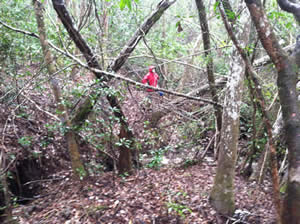 |
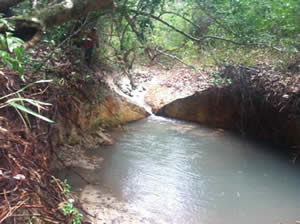 |
Alabama Soil and Water Conservation Society
Annual Meeting: Creating a Clean Water Future through Water and Soil Conservation
June 22 - 24, 2015
Five Rivers Delta Resource Center
30945 Five Rivers Boulevard
Spanish Fort, Alabama
Map to location
Registration
Before May 31, Early Bird registration: $125 (SWCS member) $150 (non-member)
On-site registration: $150 (SWCS member) $175 (non-member)
Student registration: $20
Daily rates:
June 22 Technical Session: $50
June 23 Field Trip: $75
June 24 Technical Session: $50
Vendor / Exhibitor Information - online vendor registration
$250 per 8' x 10' booth (includes 2 registrations for conference)
Sponsorship opportunities available for breaks and meals, too!
Contact Skip Ragsdale by email or phone (205-674-5656) with questions on vendor / sponsor fees.
Program Description
What does clean water mean to you?
Join us as we explore the meanings and relationship of water and soil conservation to help Create a Clean Water Future for generations to come. The 2015 Alabama Soil and Water Conservation Committee's Annual Meeting will explore how we can work together to make better choices for protecting, managing, and restoring natural resources.
Program topics include:
* Create a Clean Water Future Education and Outreach Campaign
* Invasive Species Management
* Low Impact Development
* Agriculture Demonstrations
* Construction Best Management Practices
* Water and Energy Conservation
Continuing Education / Professional Development
All attendees will receive a "Certificate of Training" which will indicate contact hours for each day as documentation for professional certification requirements.
Questions?
Contact Leslie Gahagan by email or phone 251-269-1224
Lodging
A block of rooms has been reserved at the Hampton Inn on Mobile Bay (251-626-2220) for a special rate of $119 per night and the Fairfield Inn Spanish Fort (251-370-1160) for $86 per night. Group name is Alabama SWCS Annual Meeting.
Deadline for hotel reservations is June 1, 2015.
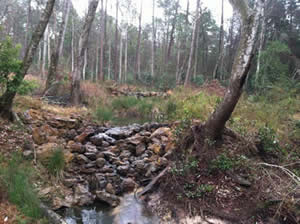 |
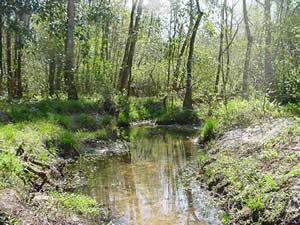 |
2014
November 4, 2014 - Bioretention Design and Implementation, Birmingham, AL
May 28, 2014 - Low Impact Development: Bioretention Design & Vegetation, Auburn, AL
April 15, 2014 - Urban Stream Enhancement Field Tour - City of Auburn Softball Park, Auburn, AL
April 9-10, 2014 - Low Impact Development Summit, Clanton, AL
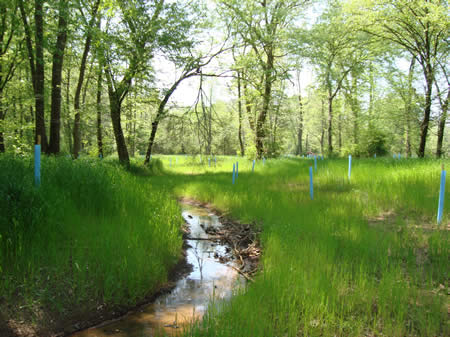 |
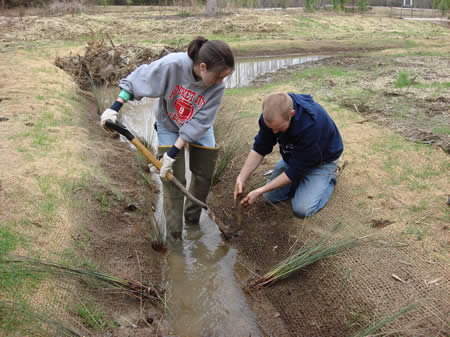 |
Back to top
Low Impact Development: Bioretention Design, Implementation, & Vegetation
November 4, 2014
Green Industry Training Center
North Shelby Library
5521 Cahaba Valley Road
Birmingham, AL 35242
Map to location
Workshop will step through design recommendations for a bioretention cell that will be constructed at the North Shelby Library. Vegetation selection and design will also be discussed.
Don't miss this hands-on opportunity to be part of a stormwater control measure installation!
Workshop limited to first 30 participants.
Who should attend?
Design and engineer professionals, landscaping professionals and local, state, and federal government agency representatives.
Participants will gain knowledge of current bioretention design, maintenance, and vegetation for successful implementation of low impact development stormwater control practices. Workshop will include design calculations.
Registration
$275 General Registration
$175 Government / Nonprofit Registration
Agenda
8:00 – Registration
8:30 – Welcome and Introductions
LID Overview
Bioretention Design
Bioretention Design Example
Vegetation and Maintenance
Lunch (provided)
Group Bioretention Design Activity and Presentation
North Shelby Library Bioretention Construction & Planting
4:30 pm Adjourn
Workshop Instructors:
Jason Zink, PE, PhD, Zink Environmental PLLC. As a professional engineer with 10+ years of experience, Jason Zink specializes in assessment, engineering design, and monitoring of ecological restoration projects, including stream restoration and innovative stormwater management. He has previously worked as an educator and researcher at North Carolina State University, and is now the Principal at Zink Environmental, PLLC.
Katie Dylewski, MS, Alabama Cooperative Extension System and Auburn University. Katie Dylewski has over 5 years experience working with local watershed groups to implement low impact development, especially related to the vegetation and maintenance recommendations. Her portfolio includes bioretention, bioswales, vegetated filters, stream enhancement and restoration, and rain garden stormwater control measures. Most recently, Katie was one of the primary authors on the Alabama Low Impact Development Handbook.
Partners include the Alabama Cooperative Extension System Green Industry Training Center, Auburn University Shelby County, Zink Environmental PLLC, and the Alabama Clean Water Partnership.
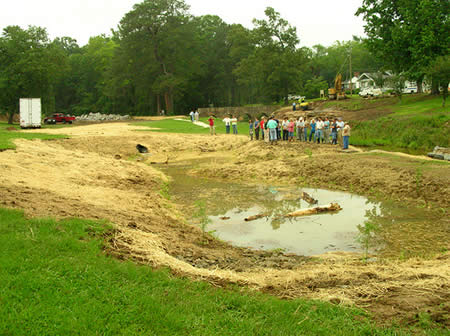 |
Low Impact Development: Constructed Stormwater Wetland Design & Vegetation
Hubbard Center for Advanced Science, Innovation and Commerce
(CASIC Center)
559 Devall Drive
Auburn, Alabama 36830
June 11, 2014
$200 General Registration
$150 Government / Nonprofit Registration
Approvedl for 0.6 Continuing Education Units (CEUs)
Workshop limited to first 30 registrants
Who should attend?
Design and engineer professionals developing or reviewing stormwater plans and local, state, and federal government agency representatives.
Participants will gain knowledge of current bioretention design, maintenance, and vegetation for successful implementation of low impact development stormwater control practices. Workshop will include design engineering calculations.
Agenda
8:00 – Registration
8:30 – Welcome and Introductions
LID Overview
Constructed Stormwater Wetland Design
Constructed Stormwater Wetland Design Example
Vegetation and Maintenance
Lunch (provided)
Group Design Activity and Presentation
Tour Constructed Stormwater Wetland Project
4:30 pm Adjourn
Workshop Instructors:
Jason Zink, PE, PhD, Zink Environmental PLLC. As a professional engineer with 10+ years of experience, Jason Zink specializes in assessment, engineering design, and monitoring of ecological restoration projects, including stream restoration and innovative stormwater management. He has previously worked as an educator and researcher at North Carolina State University, and is now the Principal at Zink Environmental, PLLC.
Katie Dylewski, MS, Alabama Cooperative Extension System and Auburn University. Katie Dylewski has over 5 years experience working with local watershed groups to implement low impact development, especially related to the vegetation and maintenance recommendations. Her portfolio includes bioretention, bioswales, vegetated filters, stream enhancement and restoration, and rain garden stormwater control measures. Most recently, Katie was one of the primary authors on the Alabama Low Impact Development Handbook.
Partners include the Alabama Cooperative Extension System, Auburn University Water Resources Center, Zink Environmental PLLC, HNP Landscape Architecture, Alabama Department of Environmental Management, and the Alabama Clean Water Partnership.
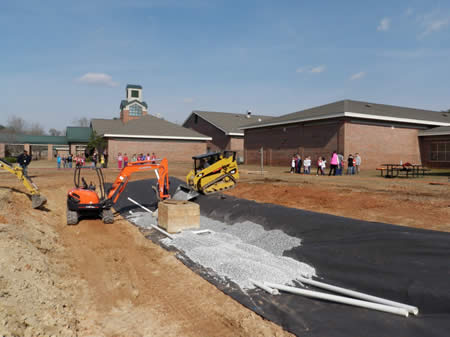 |
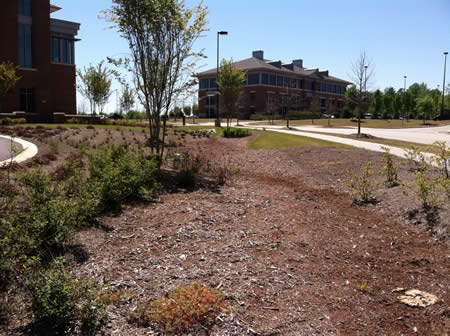 |
Low Impact Development: Bioretention Design & Vegetation
Hubbard Center for Advanced Science, Innovation and Commerce
(CASIC Center)
559 Devall Drive
Auburn, Alabama 36830
May 28, 2014
$200 General Registration
$150 Government / Nonprofit Registration
Approved for 0.6 Continuing Education Units (CEUs)
Workshop limited to first 30 registrants
Who should attend?
Design and engineer professionals developing or reviewing stormwater plans and local, state, and federal government agency representatives.
Participants will gain knowledge of current bioretention design, maintenance, and vegetation for successful implementation of low impact development stormwater control practices. Workshop will include design engineering calculations.
Agenda
8:00 – Registration
8:30 – Welcome and Introductions
LID Overview
Bioretention Design
Bioretention Design Example
Vegetation and Maintenance
Lunch (provided)
Group Bioretention Design Activity and Presentation
Tour CASIC Bioretention
4:30 pm Adjourn
Workshop Instructors:
Jason Zink, PE, PhD, Zink Environmental PLLC. As a professional engineer with 10+ years of experience, Jason Zink specializes in assessment, engineering design, and monitoring of ecological restoration projects, including stream restoration and innovative stormwater management. He has previously worked as an educator and researcher at North Carolina State University, and is now the Principal at Zink Environmental, PLLC.
Katie Dylewski, MS, Alabama Cooperative Extension System and Auburn University. Katie Dylewski has over 5 years experience working with local watershed groups to implement low impact development, especially related to the vegetation and maintenance recommendations. Her portfolio includes bioretention, bioswales, vegetated filters, stream enhancement and restoration, and rain garden stormwater control measures. Most recently, Katie was one of the primary authors on the Alabama Low Impact Development Handbook.
Stephen Schrader, PLA, ASLA, is with HNP Landscape Architecture in Birmingham, Alabama. He was the project landscape architect for the CASIC Center, including its pervious paving and bioretention cell, completed last summer. Stephen's previous presentations have included demonstrations on using technology to create and document sustainable site development. He is the immediate past president of the Alabama Chapter of the American Society of Landscape Architects and serves on Auburn's Landscape Architecture Advisory Council.
Kenneth Ussery, PE, LEED, AP,is the Atlanta Branch Manager for LBYD Inc. and served as the Senior PM on the CASIC Project and lead Civil designer of the storm water management system including the bio-retention swale and pond. He has over 18 years of experience in Civil Engineering that includes LID master-planning and engineering of storm water management and water quality facilities. Water quality design includes everything from small enhanced swales and rain gardens to large bio-retention ponds and vegetated filtering systems.
Eve Brantley, PhD, Alabama Cooperative Extension System and Auburn University. Eve currently serves as the Water Resources Specialist for the Alabama Cooperative Extension System and as an Associate Professor with the Auburn University Department of Crop, Soil and Environmental Sciences. She has worked with watershed management, restoration, and education at the local, state, and regional scales.
Partners include the Alabama Cooperative Extension System, Auburn University Water Resources Center, Zink Environmental PLLC, HNP Landscape Architecture, LBYD, Inc., Alabama Department of Environmental Management, and the Alabama Clean Water Partnership.
Urban Stream Enhancement - City of Auburn Softball Park
City of Auburn Softball Complex
South College Street
Auburn, Alabama
Presentations (PDF)
Urban Stream Construction and Structures
Native Plant Strategies
Case Study - Parkerson Mill Creek, Municipal Softball Reach
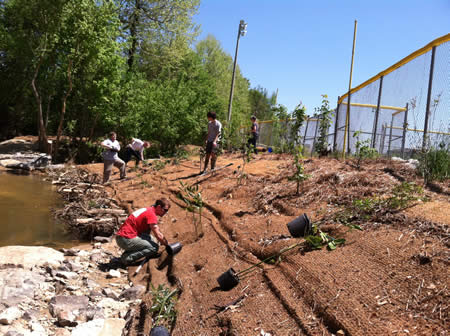 |
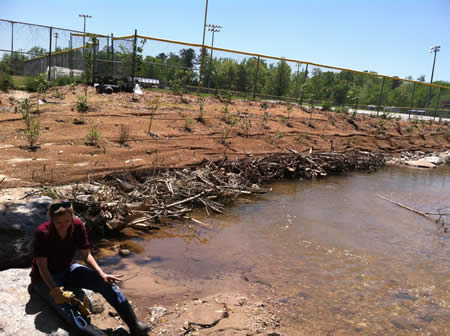 |
Project partners: City of Auburn, Alabama Cooperative Extension System, Auburn University, Parkerson Mill Creek Watershed Project, Alabama Department of Environmental Management, North State Environmental, Jennings Environmental.
When: April 15, 2014 9:30 am - noon (Rain date April16)
Registration: $75 (0.2 Continuing Education Units, Auburn University)
Registration limited to 30.
Who should attend?
Design and engineer professionals developing stream restoration designs and local, state, and federal government agency representatives reviewing and permitting stream restoration projects.
Workshop will accompany an urban stream restoration project scheduled for construction in April 2014 in Auburn, Alabama. Participants will gain knowledge of natural channel design concepts for stream and floodplain restoration projects, especially related to infrastructure protection.
Project components include toe-wood, log and boulder vanes, stormwater outfall protection, and native vegetation.
*Participants should bring a safety vest, hard hat, and dress appropriately for construction site tour (long pants, sturdy shoes).
Agenda:
| 9:30 - 10:30 am | Classroom overview | |
Stream enhancement components |
||
| 10:30 - 11 am | Break and move to project | |
| 11 am - noon | Field tour of stream enhancement, native plant installation | |
| noon | Adjourn (participants are welcome to stay and observe) |
2013
March 13-14 - Urban Stream Restoration Implementation Workshop, Auburn, AL
March - Stream Construction and Vegetation Field Tour, Phenix City, AL
May 1 - Rain Garden Certification, Anniston, AL
September - Urban Stream Restoration Workshop and Tour, Trussville, AL
November 2013 - Coastal Alabama Restoration Conference
Visit the ACES Rain Garden Certification page to see who in your community has completed the workshop and exam
Backyard Stream Repair
TBA
Opelika, Alabama
Hamilton Gables Subdivision
Who should attend? Landscape and home grounds professionals, local government representatives, and interested citizens.
Rapidly eroding streams, property loss, and safety concerns are common in urban and suburban streams. But what is the answer? Stabilizing small scale erosion problems through regrading streambanks, planting deeply rooted native vegetation, and implementing no-mow zones can help.
Join us at this backyard stream repair tour to learn more about appropriate and effective solutions to small scale stream erosion. Topics to be covered include stream stability, erosion and sediment control, seed mixes, native vegetation, and construction.
REGISTRATION
There is no charge for the field tour, but registration is requested.
Online registration (available soon)
Urban Stream Restoration Implementation
March 13-14, 2013
Auburn, Alabama
Location EW Shell Fisheries Center, 2101 North College Street
Presentations and Resource Materials (PDF):
Urban Stream Introduction
Urban Stream Morphology
Stream Vegetation Considerations
Case Studies
Plan Sheets
Who should attend? Design and engineer professionals developing stream restoration designs and local, state, and federal government agency representatives reviewing and permitting stream restoration projects.
Workshop will accompany an urban stream restoration project scheduled for construction in March 2013 in Auburn, Alabama. Participants will gain knowledge of natural channel design concepts for stream and floodplain restoration projects, especially related to infrastructure protection.
Participants will work through the concepts of designing stream channel, discussion of in-stream structures, permitting, construction, and vegetation. Other topics include stormwater management and habitat enhancement features.
Basic understanding of stream assessment and morphology is a suggested prerequisite. Participants are encouraged to dress for field activities.
1.3 continuing education units (CEUs) from Auburn University will be awarded.
REGISTRATION
General Registration $375
Government / Nonprofit Registration $250
Registration includes resource notebook, access to presentations, and refreshments and lunch each day. Workshop is limited to the first 25 participants.
Agenda (pdf)
Instructors:
Greg Jennings, PhD, PE, Jennings Environmental LLC
Eve Brantley, PhD, Auburn University
Darrell Westmoreland, North State Environmental, Inc.
Mike Shaffer, PE, Watershed Science, Inc.
David Bidelspach, PE, Stantec
Dr. Jennings has 24 years experience in design, implementation, assessment, and education on stream restoration and related water resource engineering projects. He will teach about practical approaches for applying hydrology, hydraulics, and fluvial geomorphology principles to urban stream restoration and enhancement.
Dr. Brantley has 15 years experience in ecological restoration implementation, evaluation, and education. She will teach about vegetation planning and management for stream restoration projects as well as landowner and public engagement in watershed project implementation.
Mr. Westmoreland has 22 years experience in construction of complex environmental projects, with emphasis on stream and wetland restoration projects throughout the USA. He will teach on practical considerations for planning and implementing successful stream construction jobs.
Mr. Shaffer has 10 years experience in water resource project implementation and evaluation. He will teach in the field on practical applications of construction planning, stakeout, and monitoring for successful stream projects.
David Bidelspach, PE, Stantec. David has 10 years experience designing and implementing over 100 stream restoration projects throughout North America, including many complex urban stream projects. He will be instructing about hydraulic analyses essential for successful urban stream projects.
Lodging Options:
Auburn Hotel and Conference Center
Holiday Inn Express
Hilton Garden Inn
Sleep Inn & Suites
Project partners include City of Auburn, Alabama Department of Transportation, Saugahatchee Watershed Management Plan, North State Environmental, Inc., Alabama Cooperative Extension System, Auburn University, and Alabama Department of Environmental Management.
Stream Construction and Vegetation Field Tour
March, 2013
Phenix City, Alabama
Broad Street
Join us for a tour of the Broad Street Bridge stream enhancement project that includes an overview of project goals, stream construction, and restoration vegetation.
REGISTRATION
There is no charge for the field tour, but registration is requested.
Online registration (available soon)
Partners include City of Phenix City, Mill Creek Watershed Management Plan, Alabama Cooperative Extension System, Auburn University,and the Alabama Department of Environmental Management.
Rain Garden Certification
May1, 2013
Cane Creek Community Center, Ft. McClellan
77 Justice Avenue, Anniston, AL
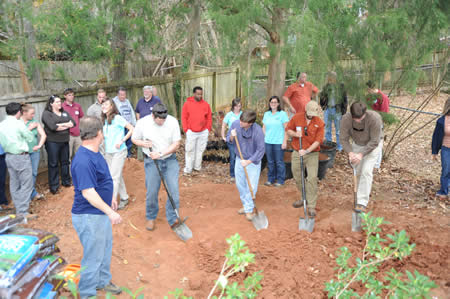
8:30-9 am Registration
9 am-3:30 pm Workshop training
Who Should Attend
- Gardeners & Homeowners
- Commercial and residential landscapers
- Landscape architects
- Design engineers
Advantages of earning the professional certification
- Your company will be included in the listing of Certified Rain Garden Professionals in Alabama
- Increase marketing and sales potentials
- Distinguish your company by offering additional services
About the workshop:
As homeowners and property managers become more aware of the issues of stormwater management, many of them are choosing to manage the runoff from their homes and businesses with rain gardens. Rain gardens are shallow depressions and serve as landscape features that can effectively collect and treat stormwater and reduce localized flooding. Rain gardens can be integrated into the existing landscape as a retrofit or be included in the initial landscaping plan.
* Approved for 0.5 Continuing Education Units (CEUs) from Auburn University
$75 General registration (receive ACES professional Rain Garden certification, CEUs, resource notebook)
$15 Stakeholder registration (receive resource notebook)
Contact Christy Claes, Choccolocco Watershed Alliance or Eve Brantley, Alabama Cooperative Extension System,with questions.
Presentations (PDF)
Introduction
Rain Garden Location & Design
Rain Garden Construction
Rain Garden Vegetation
Maintenance, Lessons Learned, & Summary

 Menu
Menu


